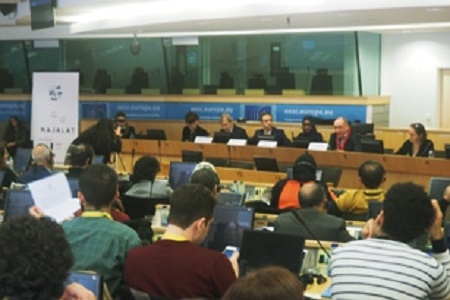Majalat: A Structured Dialogue

In 2012, the European Commission adopted a strategy to build partnership with the civil societies “at the roots of democracy” in the countries where it supports projects. The new approach follows a “roadmap” negotiated with host governments in some 100 countries. In the MENA region, this innovation coincided with dramatic changes in the dynamic, owing to the series of uprisings. The first generation of the civil society-engagement policy involved roadmaps for Algeria, Egypt, Iraq, Lebanon, Mauritania, Morocco, Palestine and Tunisia.
Within this frame, a group of civil society organizations (CSOs) in the Southern European Neighborhood launched an initiative of structured dialogue. The project known as Majalat [“fields,” in Arabic], has been led by the Arab NGO Network for Development (ANND), the Euro-Mediterranean Human Rights Network (EuroMedRights), the Arab Trade Union Confederation (ATUC) and the Arab Forum for Alternatives.
This initiative implements a key recommendation of the last regional dialogue between MENA civil society and EU institutions held at Beirut in 2017 to formulate a regional policy agenda, to promote CSO participation on issues that civil society organizations identified as a priority, and to support networking at the regional level.
The MENA organizations identified the following set of priorities to frame the initiative:
- 1. Security and facing violence,
- 2. Migration and mobility,
- 3. Good governance and the rule of law,
- 4. Economic development and social dialogue,
- 5. Social and climate justice.
In addition to these priority fields, the region’s CSOs face other challenges to consider in policy formulation with the EU. These include the narrowing space and independence of civil society, obstacles to accessing official information and mobilizing sustainable resources, in addition to persistent wars and conflicts in the region that hamper CSOs’ capacity as an indispensable partner in building stability, sustainable development and peace.
The Majalat group organized its first regional meeting at Amman in September 2018, convening many of the region’s CSOs to discuss and assess key priorities, building on previous dialogue exercises. That was followed in December 2018 by the first dialogue with EU institutions in the Regional Civil Forum at Brussels.
At the Brussels meeting, CSOs challenged some of the EU’s neighborhood policies. The most important of these was the avoidance of root impediments to development and equal relations at the regional and global levels. More specifically, they pointed out that the EU partnership agreements impose conditions and interests of the stronger parties. They rejected the inclusion of Israel, an alien colony, within the framework of the regional partnership and found the EU’s consequent denial of the Palestinian people’s inalienable right to self-determination to be politically and morally unacceptable.
Civil society also discussed with EU officials some cross-cutting issues, such as the needed human rights-based approach to implementing European Neighborhood Policies, supporting effective protection to human rights defenders, vulnerable social groups and social protection. In this light, CSOs called on the EU to define and implement its policies better.
Under the current 2nd generation of the CSO-engagement roadmaps (2018–20), a full cycle of thematic and national meetings will take place. The most-recent thematic workshop took place at Beirut on 6–7 April 2019 to address economic policies and social dialogue. The final outcomes will be reviewed at the 2020 Regional Conference on Southern Neighborhood Policy and Brussels Civil Forum.
To learn more about the structured dialogue process please click on Majalat.
|